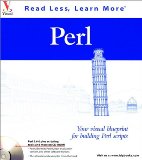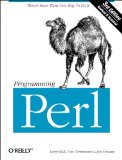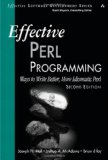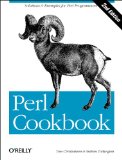 |
| | | | | | | | | | | | | | |
Glossary - Perl
 Perl, the Practical Extraction and Reporting Language, is a very powerful and extremely flexible scripting language that was created by Larry Wall in 1987. Since its inception it evolved to become naturally modular (with the major extensive library centralized in CPAN {and CPAN2}), consistently and efficiently integrate with databases, and support OO (Object Oriented) programming styles, along with many other interesting and useful features.
Perl, the Practical Extraction and Reporting Language, is a very powerful and extremely flexible scripting language that was created by Larry Wall in 1987. Since its inception it evolved to become naturally modular (with the major extensive library centralized in CPAN {and CPAN2}), consistently and efficiently integrate with databases, and support OO (Object Oriented) programming styles, along with many other interesting and useful features.
Amazing development productivity is evidenced by the fact that a single line of Perl code resembling line noise [from the glorious time of long ago when the BBS technology reigned supreme before the popularization of the internet] is more useful than 20 (or more) lines of code in many other common programming languages.
When the World Wide Web was in its infancy, Perl played an integral role in the development of interactive web sites because it made it possible for web masters to use CGI, which continues to be the defacto standard for interactive web sites today. As other languages later began to adopt CGI support, Perl had already evolved even further with technologies such as ModPerl, which integrates into the ubiquitous Apache HTTPd server and now, since the introduction of LibApReq 1, supports high-performance CGI interoperability at the lowest levels while also enhancing the high level language programming that can optionally support many levels of abstraction with ease while also ensuring the lowest possible overhead.
Today, the Canadian branch of the Lumber Cartel uses ModPerl 2 in conjunction with Apache HTTPd 2.2 (with the LibApReq 2 libraries) for both dynamic content generation and database interaction (we also use the Perl DBIx {a.k.a., DBIC} libraries with a PostgreSQL back-end).
| |||||||||
Due to its practicality, stability, usefulness, and stable cross-platform implementations, Perl successfully continues to be extremely popular as a language, used by system administrators, web masters, and a wide range of other professionals from all industries in all parts of the world where computers are in use. Many well-respected Operating Systems come with a recent version of Perl installed by default, including OpenBSD and a great many Linux distributions (system administration is one common reason), and a wide range of both closed- and open-source solutions depend on Perl and many of its libraries (e.g., the well-known Spam Assassin, a very effective security application used throughout the internet industry that aids in both server-side and client-side spam filtering).
Free peer-support is also plentiful in traditional mediums such as web-based forums, usenet [NNTP] newsgroups, eMail lists, etc., plus one of the most prominent that stands out is IRC (Internet Relay Chat) not only because the #perl channels in most IRC networks are well-populated to the point of often being among the busiest and most popular channels, but also because there is an entire IRC network called irc.perl.org which is dedicated specifically to Perl and the hundreds of specializations therein (if not for this network, the perl channels on other IRC networks would be even busier because many users were drawn away from the other networks due to the helpful topical specializations).
Licensing
Where licenses such as the GPL are, unfortunately, still controversial for many commercial organizations that are concerned about intellectual property, the Artistic License that Perl is covered under, like the Apache and BSD licenses, hasn't created any such concerns, which means it's generally a safe, conservative choice for businesses.
See also
- http://www.perl.org/
- Larry Wall's home page
- Learn Perl - beginners should start here
- use Perl; a central Perl community news and discussion web site
- CPAN - The Comprehensive Perl Archive Network
- Perl Buzz: Perl news, blogs, and more
- ModPerl - the full power of the Perl programming language and the Apache HTTP server
- DBI - standard database support for Perl
- Regular Expressions - tutorials, examples, and reference
- ModPerl.pl - the mod_perl resource centre
[Home] [Profile] [Glossary] [Library] [Resources] [Tools] [FAQ] [Site map] [Contact us]
Copyright © 2004-2025 Inter-Corporate Computer & Network Services, Inc. All rights reserved.
All trademarks are the property of their respective owners.




